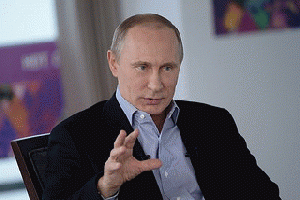Is Karen Dawisha the Credible Expert She Claims to Be?
The recent Frontline program called "Putin's Way" is largely based on the work of Miami University professor Karen Dawisha. Author of the recently released, Putin's Kleptocracy, she has been making the rounds of talk shows and has had her book reviewed by all the major newspapers and magazines, including the New York Times, New York Review of Books, Washington Post, Wall Street Journal and the Economist.
However, if a more critical eye is put to Dawisha's work, one may realize that she is not the most credible source on Russia or its president. Making a documentary program with no other academic or journalistic experts on Russia, government officials or business people is short sighted. Not performing due diligence as to the claims she and the handful of others on the program make, does not serve the interests of informing viewers about Russia's political history, economy or current leadership.
Dawisha's book about Putin's alleged corruption is admittedly based on a lot of rehashed claims made over the years by various people with an axe to grind but no substantive evidence. Furthermore, a lot of the sources cited are conveniently not available for verification for one reason or another as is admitted by Dawisha's cheerleader Anne Applebaum (1), including supposed evidence from court cases that were dismissed, material collected by Russian and European journalists which have vanished from the internet (presumably this material was not available for review offline) and out of print Russian legal journals.
It should also be noted that this is Dawisha's first book on Russia related issues in 17 years, which makes one wonder how up to date she is on the topic. Her original British publisher declined to go ahead with the book, fearing violation of libel laws, which indicates that they were not confident of her sources upon closer scrutiny. (2)
Even in her articles promoting the book, Dawisha does not provide a balanced and accurate depiction of the issues. For example, in a New York Times article from December 3, 2014 called "Bad Mannered Russians in the West," Dawisha makes the following statement:
"The market increasingly recognizes the risk of dealing with Russian companies, the largest of which is Gazprom. Despite having the world's largest net profits, Gazprom was trading at one-third the stock market valuation of Exxon Mobil, due to what is widely regarded as rampant and Kremlin-directed corruption." (3)
Yes, there are issues with Gazprom, but the latter part of that statement is interesting when one considers that Transparency International's most recent report states that the Russian gas company scored higher than Apple, Amazon and Google, which are notorious for having poor scores, while another state owned fossil fuel company, Rosneft, actually scored higher than Exxon Mobil. (4) The World Bank has also ranked Russia at 62 on their recent "ease of doing business" list, moving up from 120 (out of 180) in 2011. (5) How is this possible under the extreme and incorrigible conditions of corruption that Dawisha contends represent Russia uniquely under Putin?
It's not exactly a news flash that corruption is still an issue in Russia, but to provide no historical context about the dynamics of corruption in Russia is misleading at best.
90% of all corruption in Russia is estimated to be at the local level. (6) Part of the reason this kind of corruption persists is due to the strong historical roots of getting essential things done via "connections" and its associated prestige rather than the rule of law as a foundation. This was the case in Czarist Russia as tributes were typically paid in the form of goods or money to officials as part of the feudalist-like system, which was gradually dismantled in the rest of Europe but continued in Russia. Due to Russia's sprawling geographic size and lack of a developed transportation system, interaction with the outside world and the attendant exposure to new ideas was hindered through the 19th century.
Russians'
relationship with governmental authority was modeled on the administrative
state system inherited from the Mongols in the 13th century. Consequently, Russians' social contract had never
been that of a citizen with rights or sovereignty but as subjects that were
granted stability and varying amounts of social protection in exchange for
submission to state authority.
Submission was enforced by a harsh bureaucracy. (6) (7)
This arrangement of deference to authority and reliance on "connections" to obtain necessities continued under the Soviet system with deference to authority demanded in exchange for security, stability and a degree of social protections. There was also the Communist Party bureaucracy with party managers who lorded over their respective regions.
When Dawisha claims to have had a revelation that Russia is not a democracy that is failing but an authoritarian system being built successfully under Putin, she is misleading the audience. Anyone who is acquainted with Russian history knows that Russia has had authoritarian rule for 1,000 years and has only been developing toward any kind of democracy for 25 years. It is a not full-fledged democracy yet, but it is more democratic and less authoritarian than it has been in its history, with the exception of Gorbachev's brief period of rule.
As has been well documented elsewhere, corruption had reached its heights in Russia in the 1990s under the leadership of Boris Yeltsin when vast fortunes were made by a small group of well-connected Russians (the eventual oligarchs) who bought up the Soviet Union's major industries and resources at fire sale prices through schemes that were often authored and encouraged by Western economic "advisors."
Next Page 1 | 2 | 3 | 4 | 5 | 6
(Note: You can view every article as one long page if you sign up as an Advocate Member, or higher).






